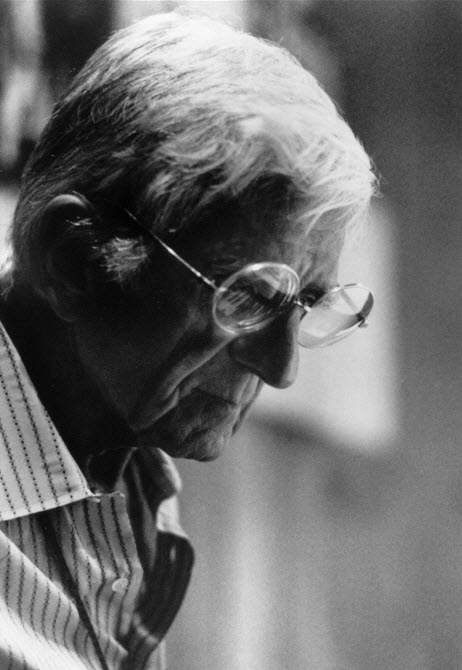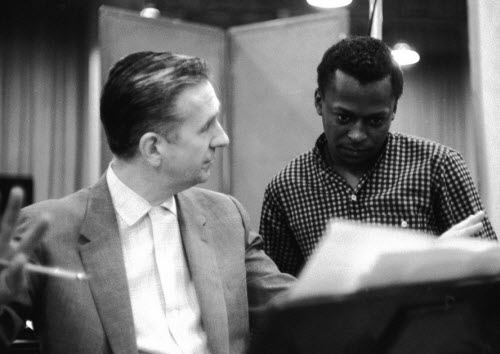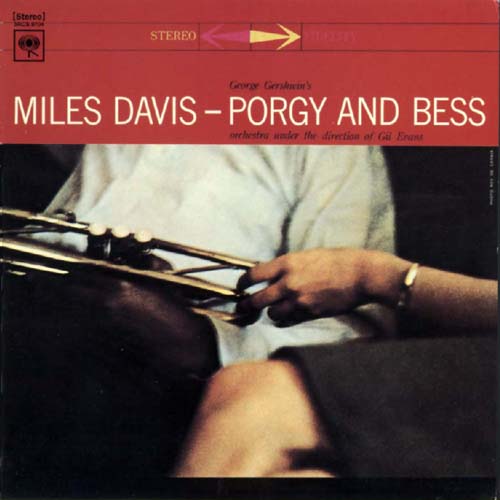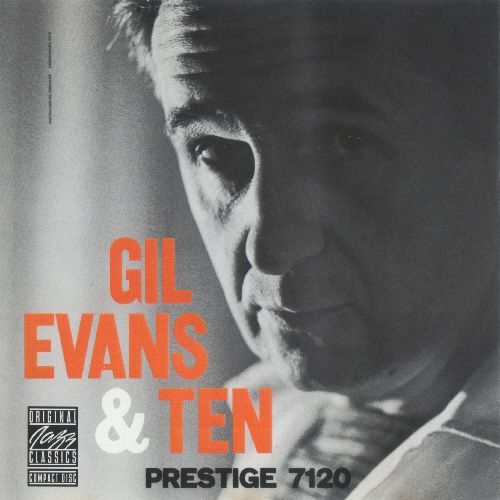He does it all, and he does it in ways that surprise you and conform to the needs and the genius of the soloist.
~Gary Giddins, jazz writerEvans, like most musical geniuses (a title bestowed by Miles [Davis]) shows a roving spirit and a probing desire to create new sounds, investigate new territories, and not be pigeon-holed into one space.
~R.J. Deluke (allaboutjazz.com)
Gil Evans Documentary 1997 Amerimage – 54min
Miles Davis & Gil Evans – 1959
- “The Duke” and “Blues for Pablo”
Wikipedia:
| Birth name | Ian Ernest Gilmore Green |
|---|---|
| Born | May 13, 1912 Toronto, Ontario, Canada |
| Died | Cuernavaca, Mexico |
| Genres | Jazz, third stream, Cool jazz, Modal jazz, Jazz fusion, Free jazz |
| Occupations | Pianist, Composer, Arranger, Bandleader |
| Years active | 1933–1988 |
| Labels | Impulse! Records, Prestige Records, Verve Records, Columbia Records, World Pacific Records |
| Associated acts | Miles Davis, Ryo Kawasaki, Kenny Burrell |
Ian Ernest Gilmore “Gil” Evans (né Green) (May 13, 1912 – March 20, 1988) was a jazz pianist, arranger, composer and bandleader, active in the United States. He played an important role in the development of cool jazz, modal jazz, free jazz and jazz fusion, and collaborated extensively with Miles Davis.
Gil Evans and Ten – Remember:
Highlights from his career:
while Miles Davis was under contract to Columbia Records, producer George Avakian suggested that Davis work with any of several arrangers. Davis immediately chose Evans. The three albums that resulted from the resulting collaboration are Miles Ahead (1957), Porgy and Bess (1958), and Sketches of Spain (1960). Another collaboration from this period, Quiet Nights (1962) was issued later, against the wishes of Davis, who broke with his then-producer Teo Macero for a time as a result. Although these four records were marketed primarily under Davis’s name (and credited to Miles Davis with Orchestra Under the Direction of Gil Evans), Evans’s contribution was as important as Davis’s. Their work coupled Evans’s classic big band jazz stylings and arrangements with Davis’s solo playing. Evans also contributed behind the scenes to Davis’ classic quintet albums of the 1960s.
Miles Davis & Gil Evans – “Summertime” (Porgy & Bess):
The demands of the score for Porgy and Bess were legendary, including the very first note for the lead trumpet. The limited time allotted for rehearsals revealed that the ability to read such a challenging score was not consistent among jazz musicians, and there are many audible errors. Yet the recording is now regarded by many as one of the greatest reinterpretations of Gershwin’s music in any musical style, because Evans and Davis were each devoted to going outside the “mainstream” of commercial expectations for jazz musicians. Evans was a great influence on Miles Davis’s interest in “non-jazz” music, especially orchestral music.
From 1957 onwards Evans recorded albums under his own name. Evans knew tubist Bill Barber and trumpeter Louis Mucci from Thornhill’s band, and both were stalwarts in Evans’ early ensembles, with Mucci finding a spot on nearly every pre1980s Evans recording. Among the featured soloists on these records were Lee Konitz, Jimmy Cleveland, Steve Lacy, Johnny Coles and Cannonball Adderley. In 1965 he arranged the big band tracks on Kenny Burrell’s Guitar Forms album.
Gil Evans and Ten – Big Stuff:
Album of the day
Gil Evans & Ten (1957)
Other March 20:
- Jimmie Lawrence Vaughan (born 20 March 1951 in Dallas County, Texas) is an American blues rock guitarist and singer based inAustin, Texas. He is the older brother of the late, Texas blues guitar legend, Stevie Ray Vaughan.Several notable blues guitarists have had a significant influence on Vaughan’s playing style including Freddie King, Albert King, BB King, and Johnny “Guitar” Watson.

- Jerry Reed Hubbard (March 20, 1937 – September 1, 2008), known professionally as Jerry Reed, was an American country music singer, guitarist, and songwriter, as well as an actor who appeared in more than a dozen films. His signature songs included “Guitar Man,” “A Thing Called Love,” “Alabama Wild Man,” “Amos Moses”, “When You’re Hot, You’re Hot” (which garnered a Grammy Award for Best Male Country Vocal Performance), “Ko-Ko Joe”, “Lord, Mr. Ford”, “East Bound and Down” (the theme song for the 1977 blockbuster Smokey and the Bandit, in which Reed co-starred), “The Bird,” and “She Got the Goldmine (I Got the Shaft)”.
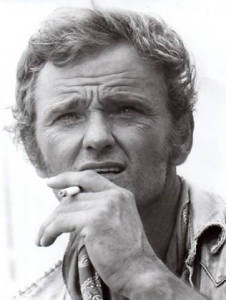
– - “A Mess of Blues” is a song written by Doc Pomus and Mort Shuman that was originally recorded by Elvis Presley for RCA Records in 1960, reaching number 32 in the US charts and number 2 in the UK charts.
A-side It’s Now or Never Released July 5, 1960 Recorded March 20, 1960 Genre Rock and Roll Length 2:40 Label RCA Victor Writer(s) Doc Pomus, Mort Shuman
-Egil

